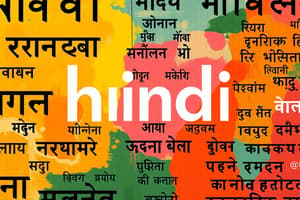Podcast
Questions and Answers
What is the primary script used for writing Hindi?
What is the primary script used for writing Hindi?
- Devanagari (correct)
- Arabic
- Cyrillic
- Latin
From which language did Hindi evolve?
From which language did Hindi evolve?
- Tamil
- Urdu
- Sanskrit (correct)
- Bengali
Which of the following is NOT a dialect of Hindi?
Which of the following is NOT a dialect of Hindi?
- Awadhi
- Tamil (correct)
- Bhojpuri
- Khadi Boli
Which word order is primarily used in Hindi grammar?
Which word order is primarily used in Hindi grammar?
What is one major challenge faced by the Hindi language?
What is one major challenge faced by the Hindi language?
Flashcards are hidden until you start studying
Study Notes
Overview of Hindi
- Hindi is an Indo-Aryan language.
- It is one of the official languages of India and a recognized language in several other countries.
- The primary script used is Devanagari.
Historical Development
- Evolved from Sanskrit through the Prakrit languages.
- Emerged as a distinct language during the 7th-10th centuries CE.
- Significant literary traditions dating back to the 11th century.
Dialects
- Numerous dialects, including:
- Khadi Boli (standard Hindi)
- Bhojpuri
- Awadhi
- Magahi
- Rajasthani
Linguistic Features
- Phonetics: Rich in vowels and consonants, includes aspirated and unaspirated sounds.
- Grammar: Subject-Object-Verb (SOV) word order.
- Noun genders: Masculine and Feminine.
- Cases: 7 grammatical cases.
Vocabulary
- Borrowed words from Sanskrit, Persian, Arabic, and English.
- Extensive usage of compound words.
Usage and Speakers
- Approx. 500 million native speakers.
- Widely spoken in northern and central India.
- Used in various forms of media: films, literature, and radio.
Literature and Culture
- Rich tradition of poetry and prose.
- Major literary figures: Tulsidas, Mirza Ghalib, and Premchand.
- The Ramayana and Mahabharata influence remains significant.
Modern Context
- Hindi is promoted by the Indian government and is a medium of instruction in schools.
- Hindi cinema (Bollywood) has popularized the language globally.
- Language learning is encouraged in various countries due to cultural exchanges.
Challenges
- Regional languages and dialects compete with Hindi.
- Variations in vocabulary and pronunciation may cause misunderstandings among speakers from different regions.
Overview of Hindi
- Hindi is an Indo-Aryan language, one of the official languages of India and recognized by several other countries.
- The primary script used is Devanagari.
Historical Development
- It evolved from Sanskrit through the Prakrit languages.
- It emerged as a distinct language during the 7th-10th centuries CE.
- It has significant literary traditions dating back to the 11th century.
Dialects
- There are numerous dialects of Hindi, including Khadi Boli (standard Hindi), Bhojpuri, Awadhi, Magahi, and Rajasthani.
Linguistic Features
- The phonetics of Hindi are rich in vowels and consonants, including aspirated and unaspirated sounds.
- Hindi's grammar follows a Subject-Object-Verb (SOV) word order.
- Nouns have masculine and feminine genders.
- There are 7 grammatical cases in Hindi.
Vocabulary
- Words have been borrowed from Sanskrit, Persian, Arabic, and English.
- Hindi has extensive usage of compound words.
Usage and Speakers
- Approx. 500 million people are native speakers of Hindi.
- It is widely spoken in northern and central India.
- It's used in various forms of media such as films, literature, and radio.
Literature and Culture
- Hindi has a rich tradition of poetry and prose.
- Major literary figures include Tulsidas, Mirza Ghalib, and Premchand.
- The influence of the Ramayana and Mahabharata remains significant.
Modern Context
- The Indian government promotes Hindi, and it is a medium of instruction in schools.
- Hindi cinema (Bollywood) has popularized the language globally.
- Language learning is encouraged in various countries due to cultural exchanges.
Challenges
- Regional languages and dialects compete with Hindi.
- Variations in vocabulary and pronunciation may cause misunderstandings among speakers from different regions.
Studying That Suits You
Use AI to generate personalized quizzes and flashcards to suit your learning preferences.




